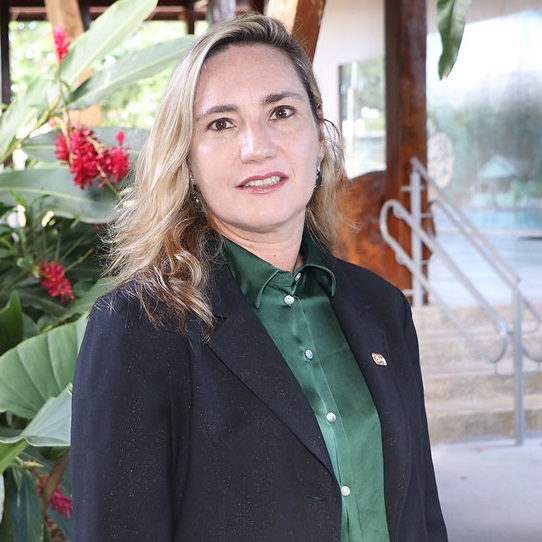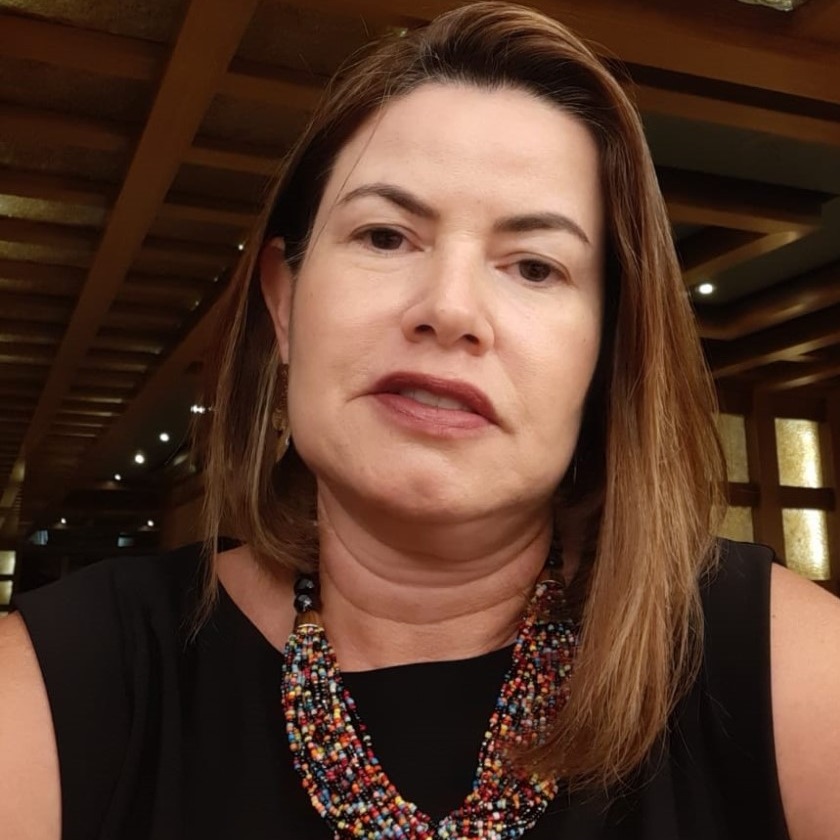Executive Officers
 Executive Board
Executive Board

President
Silvia Maria Fonseca Silveira Massruhá
Massruhá has a degree in System Analysis from the Pontifical Catholic University of Campinas (1988), a master's degree in Automation from the State University of Campinas (Unicamp) School of Electrical and Computer Engineering (1996) and a PhD in Applied Computing at the National Institute for Space Research (2003). She is a coordinator of the AgroDigital Theme Chamber in the Integrated Crop, Livestock and Forestry Systems (ICLFS) network and a member of the board of the Eldorado Research Institute and Faesp/Senar-SP's advisory board. She leads the Science Center for Development in Digital Agriculture (CCD-AD/SemeAr), backed by the São Paulo State Research Support Foundation (Fapesp). She is a member of the consulting council for Ecosystem Brazil 6.0 by SBIAgro (Brazilian Association of Agroinformatics). An Embrapa researcher since 1989, she was the head of former Embrapa Agricultural Informatics (currently Embrapa Digital Agriculture) from 2015 to 2022. It was in her administration that the Unit was strategically realigned to better reflect its multidisciplinary cross-cutting role. Prior to that, from 2009 to 2015, she worked as head of Research and Development at the same research center.

Executive Director of Innovation, Business, and Technology Transfer
Ana Margarida Castro Euler
A forestry engineer with a degree from the Federal University of Rio de Janeiro (1998), a master's degree (2002) and a PhD (2006) in Environmental and Forestry Sciences from the Yokohama National University Graduate School of Environment and Information Science, in Japan. Euler also took postdoctoral studies in Traditional Populations, Biodiversity Governance and Traditional Agricultural Systems (Sept 2021- Feb 2023) at the L'Institut de recherche pour le développement (IRD), and Centre de Coopération Internationale en Recherche Agronomique pour le Développement (Cirad) in France. She has worked with the Amazon reinforest for 20 years, with some experience in Africa (Burkina Faso, Kenya, Ghana). Between 2003 and 2008 she worked as Amazon Conservation Officer at WWF-Brazil, coordinating the Southwest Amazon Program, responsible for fundraising and the management of conservation projects developed in partnership with government and civil society organizations in Acre, Rondônia and southern Amazonas. Between 2011 and 2014 she was the Director-President of Amapá's State Forest Institute, where she implemented the program for the development of extractive production - PROEXTRATIVISMO; the Forest Concession Program, Amapá State Forest Program and Amapá Forum of Climate Change.

Executive Director of Research and Development
Clenio Nailto Pillon
Pillon is a child of farmers, from Santa Maria, Rio Grande do Sul. He holds a degree in Agronomy from the Federal University of Santa Maria - UFSM (1990), a Master's degree in Soils from UFSM (1994) and a PhD in Soil Science from the Federal University of Rio Grande do Sul (2000). In his early professional life, he worked in the private sector as a technical advisor and manager in one of the largest agricultural production groups of the country. He has academic experience as a substitute professor at UFSM for the Agronomy and Animal Science courses, and as a collaborator and permanent member of Graduate Schools, having advised 16 Master's and PhD students, in addition to numerous undergraduate students. He is currently a permanent member of the Graduate Program in Territorial Development and Agroindustrial Systems at the Federal University of Pelotas. He joined Embrapa Swine and Poultry as a researcher in 1999. Later, as a member of Embrapa Temperate Agriculture's staff, he led several external funding projects through Technical and Financial Cooperation Agreements with public and private companies, development agencies and with the Embrapa Management System. He has extensive experience as a Science, Technology and Innovation manager. At Embrapa Temperate Agriculture, he served as Technical Advisor, as Deputy Head of Research and Development between 2007 and 2011, and as General Manager between 2011 and 2019. At Embrapa, he participated in numerous institutional forums, working groups, committees and councils, especially CONAGRO (FIERGS Agribusiness Council), and in the External Advisory Committees (CAEs) for Embrapa Rice and Beans, Embrapa South Livestock, Embrapa Semi-arid Region and Embrapa Dairy Cattle; and in Embrapa's Strategic Management Committee - CGE, at the time one of the tiers that defined Embrapa's strategy for every four years. In his work as a ST&I manager, he had the opportunity to interact and articulate action with many Embrapa Units, social organizations, State Agricultural Research Organizations (OEPAs), public and non-public Technical Assistance and Rural Extension (TARE) corporations, leaders in strategic production chains, public managers, policy makers and congresspeople.
He has experience in the area of Agronomy, with studies in the area of soil science, especially soil and water management and conservation, environmental management and property sustainability assessment, the core of a project that he currently leads in partnership with the private sector. He has worked in the development of new inputs for agriculture based on the use of co-products from agro-industrial processes, which included participation in filing for patents at INPI and registering products the Brazilian Ministry of Agriculture and Livestock.

Executive Director of Administration
Selma Lúcia Lira Beltrão
Beltrão has a degree in Social Communication - Journalism from the Catholic University of Pernambuco (1988), and a master's degree in Sustainable Development in the area of Science and Technology Policy and Management, from the University of Brasília's Center for Sustainable Development -CDS (2010). She was general manager of the service unit Embrapa Technological Information (2013-2018) and worked at Embrapa's Superintendency of Communications. She was also a member, as an administrative councilor, of Embrapa's Administrative Council. She has experience in the areas of Management and Communication, with an emphasis on Communications, especially on the following topics: journalism, marketing, popularization of science, management and dissemination of technical-scientific information; editorial management, knowledge building and exchange, and experience in the areas of administration, governance, integrity and ethics, public policies, territorial development, family farming, sustainability and education.

Executive Director of Governance and Information
Alderi Emídio de Araújo
Araújo has been an Embrapa researcher since 1989 and held the post of general head of Embrapa Cotton from 2020 to 2023. An agronomist with a degree from the Federal University of Paraíba (1987), a master's degree in Plant Pathology from the Federal University of Viçosa (1994) and a PhD in Agronomy (Plant Pathology) from Esalq/USP (2008), he started his career at Embrapa Western Amazon. He researched rubber tree and African oil palm diseases until 1997, when he was assigned to Embrapa Cotton, where he was deputy head of R&D from 1999 to 2003.
He has researched sesame, peanut and sisal, important socioeconomic activities in the Brazilian Northeast. He currently coordinates the project Fungicide Management for the Control of Ramularia Leaf Spot, the main cotton leaf disease in Brazil. He is also a member of the executive committees of the Asociación Latinoamericana de Investigación y Desarrollo del Algodón (Alida) and of the International Cotton Researchers Association (Icra).
 Councils
Councils
Embrapa's General Assembly (AG)
Body that aims at promoting higher clarity and transparency to the decision-making process and precision to the control performed by the bodies below.
Administrative Council (Consad)
Responsible for organizing, controlling, and evaluating Embrapa's activities.
Audit Committee (Coaud)
Body that supports the Administrative Council in its audit and oversight roles.
National Advisory Council (CAN)
It advises on the definition and feasibility of relevant strategic actions that are relevant for planning Embrapa's schedule.
Fiscal Council (Confis)
It monitors the Corporation's asset, financial, and budget operations.
Personnel, Eligibility, Succession and Compensation Committee (Coele)
It checks the compliance of the processes of nomination and evaluation of administrators and Fiscal Council members.
Executive Board
Higher administration body responsible for planning, supervising, coordinating and controlling Embrapa's activities, and for elaborating their policies.
 Administration
Administration
 International relations
International relations
Learn about Embrapa's operations abroad and contact details for international relations. Access.